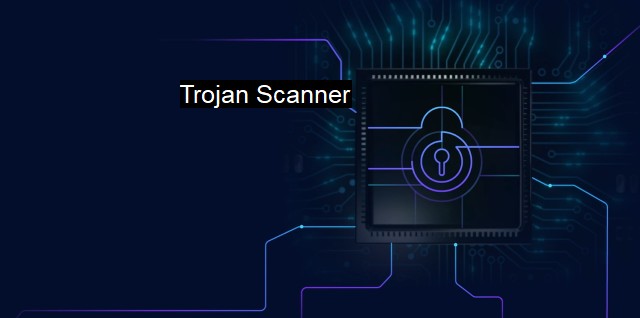What is Trojan Scanner?
The Need for Vigilance: Understanding the Importance of Trojan Scanners in Proactively Detecting Cyber Threats
A "Trojan Scanner" is a specialized antivirus software tool that is designed specifically to spot and eliminate Trojan horse threats. its application is integral to the preemptive safeguarding and remediation of systems and network amidst the increasing and rapidly evolving cyber threats.A Trojan horse, or simply "Trojan", is a type of malicious software (malware) that misrepresents itself and tricks users into downloading or running harmful programs. Named after the wooden horse used to orchestrate a covert invasion of Troy, it typifies the deceptive tactics adopted by cyber-criminals to corrupt and exploit software, steal sensitive information or gain unauthorized control of compromised systems. Its varieties include backdoor Trojans, which creates security holes or "backdoors" in a computer device, allowing unauthorized users to gain control remotely; rootkit Trojans, which grants administrator-level access to a computer or network; and banking Trojans, intended to steal the financial information of the victim.
In such a confrontational landscape, the importance of a Trojan scanner cannot be underestimated. It serves as a fully automated, bridgehead defence, running real-time scans to instantly detect Trojans and other potential threats such as viruses, worms, and spyware. Their comprehensive databases are ceaselessly updated to include the latest Trojan definitions and maintain efficacy against new threats.
Trojan scanners are integral to the process of deep scanning system files, emails, downloads and electronic input/output functions to nullify the harmful impacts of Trojans. This includes limiting damage to the internal system processes and curtailing possible advances towards invasion and anarchy. Typically offering both full system scans and quick scan options, a Trojan scanner enables targeted and efficient clean-ups tailored to perceived levels of risk and urgency.
To better explain its effectiveness, consider an office network without defense and real-time Trojan scanning. Each computer is a potential Trojan entry, which once infected can compromise the entire network severely. Utilizing a Trojan scanner, capable of automated scanning, would prevent intrusions and consequently bolster defenses significantly. A proactive strike in nature, a Trojan scanner's real-time protection function warns users the moment a Trojan horse is detected, averting possible damages instantly.
Implementation of a Trojan scanner is not a guarantee of a total safeguard, but it makes systems considerably resistant to Trojan attacks. That said, complementing a Trojan scanner with precautionary practices, like not opening suspicious emails, scrutinising downloads, and maintaining cautious dealings with unfamiliar websites, will improve odds against potential Trojan attacks.
Certain safety features render Trojan scanners more effective. Regular updates are vital to ensure the database is constantly current on new variants and potential evasion tactics. Some scanners automatically quarantine or delete detected Trojans, while others prompt the user for action. Pre-set scans during idle or low-usage duration can also enhance efficacy while economising on resources.
In sum, a Trojan scanner serves as a proactive line of defense against Trojan horses, safeguarding valuable information and limiting vulnerability of systems. Offering real-time protection and efficient diagnosis, a Trojan scanner tackles the deceptive practices of Trojans. personal awareness, safe internet practices, and regular software updates are formidable allies in this fight. In the ever-evolving battle scene of cybersecurity, the adage 'Prevention is Better than Cure' holds paramount importance, and deploying a Trojan scanner is a crucial stride towards this end. It symbolises a preparedness and strategic stand against covert invasions - a diligence and watchfulness modelled after the lessons of Troy.

Trojan Scanner FAQs
What is a Trojan scanner?
A Trojan scanner is a cybersecurity tool designed to detect and remove Trojan viruses from a computer or network. It works by scanning the system for known Trojan signatures and behavioral patterns that indicate the presence of a Trojan.How does a Trojan scanner differ from a regular antivirus?
A Trojan scanner is specifically designed to detect and remove Trojan viruses, while a regular antivirus is designed to protect against a wide range of malware threats. Trojan scanners typically use more advanced detection techniques such as behavioral analysis and sandboxing to identify suspicious activity that may not be detected by a traditional antivirus.Do I need a Trojan scanner if I already have antivirus software?
While your antivirus software may have some level of protection against Trojans, it is always recommended to use a specialized Trojan scanner for additional security. Trojan scanners are typically more effective at detecting and removing Trojans because they use more advanced detection techniques that focus specifically on this type of malware.Can a Trojan scanner detect all types of Trojans?
While a good Trojan scanner can detect and remove a wide range of Trojan viruses, it may not be able to detect every variation of this type of malware. Hackers are constantly creating new versions of Trojans that are designed to evade detection by antivirus software, so it is important to keep your Trojan scanner up-to-date with the latest threat intelligence and security updates.| | A | | | B | | | C | | | D | | | E | | | F | | | G | | | H | | | I | | | J | | | K | | | L | | | M | |
| | N | | | O | | | P | | | Q | | | R | | | S | | | T | | | U | | | V | | | W | | | X | | | Y | | | Z | |
| | 1 | | | 2 | | | 3 | | | 4 | | | 7 | | | 8 | | |||||||